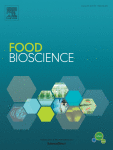Ver ítem
- xmlui.general.dspace_homeCentros Regionales y EEAsCentro Regional Tucumán - Santiago del EsteroEEA Santiago del EsteroArtículos científicosxmlui.ArtifactBrowser.ItemViewer.trail
- Inicio
- Centros Regionales y EEAs
- Centro Regional Tucumán - Santiago del Estero
- EEA Santiago del Estero
- Artículos científicos
- Ver ítem
Administration of selected probiotic mixture improves body weight gain and meat fatty acid composition of creole goats
Resumen
This work aimed to determine the effect of native probiotic administration on body weight gain, nutritional characteristics and fatty acid profile of meat of creole goats. Equally distributed forty postweaned goats (75 days old) divided into control (n=20) and probiotic (n=20) groups were fed ad libitum for 60 days with native pasture and commercial diet. Lactobacillus reuteri DDL19, Lactobacillus alimentarius DDL48, Enterococcus faecium DDE39, and
[ver mas...]
This work aimed to determine the effect of native probiotic administration on body weight gain, nutritional characteristics and fatty acid profile of meat of creole goats. Equally distributed forty postweaned goats (75 days old) divided into control (n=20) and probiotic (n=20) groups were fed ad libitum for 60 days with native pasture and commercial diet. Lactobacillus reuteri DDL19, Lactobacillus alimentarius DDL48, Enterococcus faecium DDE39, and Bifidobacterium bifidum DDBA mixed culture (108 CFU/ml, 1:1:1:1 ratio) were daily orally delivered to the probiotic group. At the end of the study, muscle samples (Longissimus dorsi, LD, and Bicep femoris, BF) were analyzed for their chemical composition (protein, fat, moisture, pH, water-holding capacity, cholesterol) and fatty acid profile. Probiotic supplementation significantly increased body weight gain, reduced the incidence of diarrhea and improved the fatty acid profile of goat meat. Probiotic-fed animals exhibited increased monounsaturated and polyunsaturated fatty acids and a significant decrease in saturated fatty acid content. Conjugated linoleic acid content was significantly higher in probiotics than in the control group (P < 0.05). Muscles from probiotics-treated goats showed healthier lipid indexes and a significant decrease in the n-6/n-3 ratio (∼2.50), atherogenic (∼0.30) and thrombogenic (∼0.75) indexes. In addition, increases in desirable fatty acids (∼79.40 g/100 g of FAME) and nutritional value index (∼2.86) were observed compared to control groups. The native mix probiotic could be used as growth promoters to reduce the antibiotics, and to improve its derived-foods.
[Cerrar]

Autor
Taboada, Natalia;
Fernández Salom, María;
Cordoba, Alicia Beatriz;
González, Silvia N.;
López Alzogaray, Soledad;
Van Nieuwenhove, Carina Paola;
Fuente
Food Bioscience 49 : 101836 (October 2022)
Fecha
2022-10
Editorial
Elsevier
ISSN
2212-4292
2212-4306
2212-4306
Formato
pdf
Tipo de documento
artículo
Palabras Claves
Derechos de acceso
Restringido
 Excepto donde se diga explicitamente, este item se publica bajo la siguiente descripción: Creative Commons Attribution-NonCommercial-ShareAlike 2.5 Unported (CC BY-NC-SA 2.5)
Excepto donde se diga explicitamente, este item se publica bajo la siguiente descripción: Creative Commons Attribution-NonCommercial-ShareAlike 2.5 Unported (CC BY-NC-SA 2.5)

